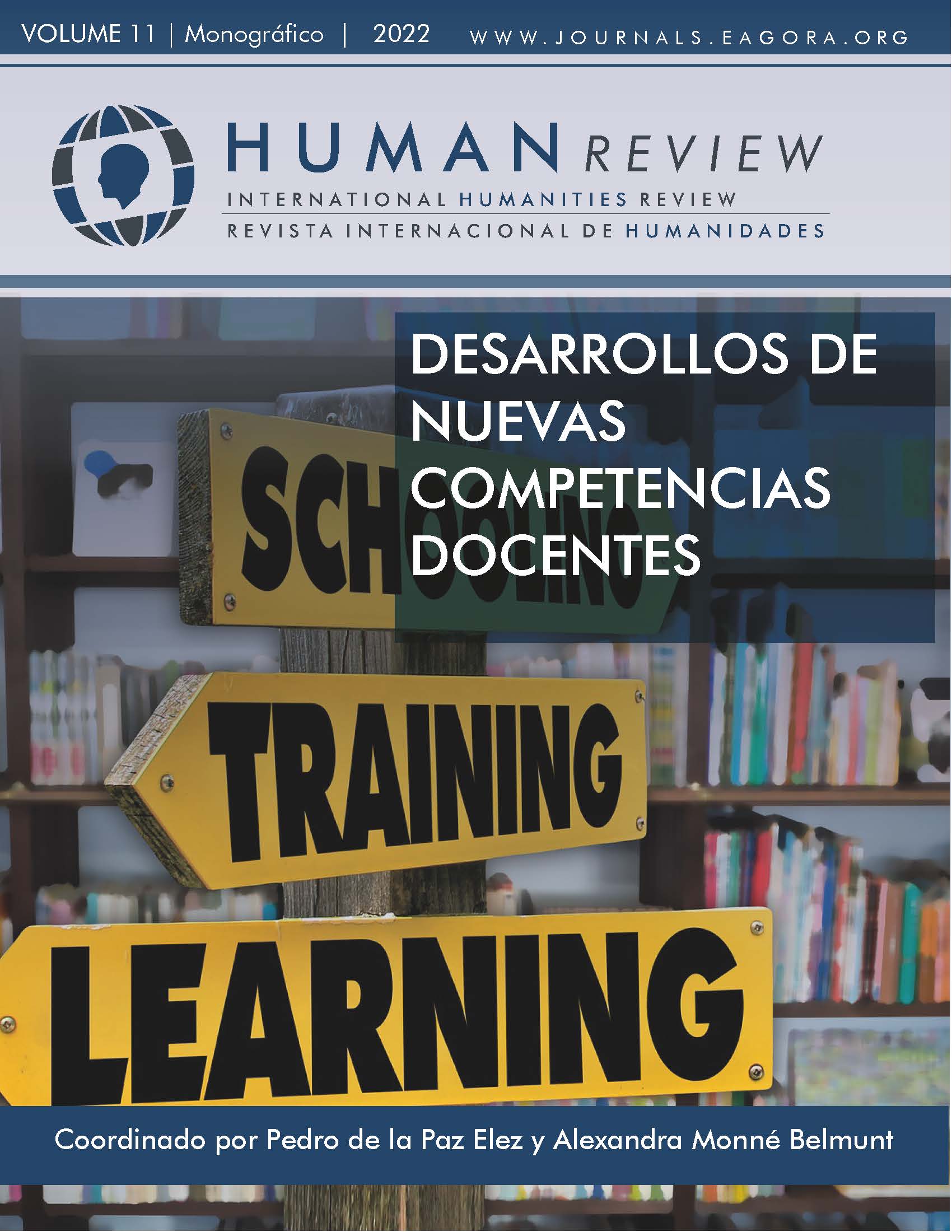Skills acquisition in basic cardiopulmnar and resuscitation in a secondary school
DOI:
https://doi.org/10.37467/revhuman.v11.3849Keywords:
Cardiorespiratory arrest, Basic Life Support, Cardiopulmonary Resuscitation (CPR), Secondary Education, Teacher Training, Skills acquisition, Bystander CPRAbstract
Cardiorespiratory arrest (CA) is one of the leading causes of death in industrialized countries. Performing cardiopulmonary resuscitation (CPR) by witnesses increases survival, however CPR training is not included in education in Spain.
In this paper we analyze the implementation of a training program for Secondary Education teachers by healthcare professionals and subsequently the acquisition of skills by students, comparing according to the trainer who instructs them (teacher or healthcare provider), at Secondary Education centre in Granada (Spain), aiming at an adequate acquisition of global skills, being better when the trainer is a teacher.
References
Böttiger, B. W., Bossaert, L. L., Castrén, M., Cimpoesu, D., Georgiou, M., Greif, R., Wingen, S. (2016). Kids Save Lives – ERC position statement on school children education in CPR. Resuscitation, 105, A1-A3. https://doi. org/10.1016/j.resuscitation.2016.06.005
Böttiger, B. W., Lockey, A., Georgiou, M., Greif, R., Monsieurs, K. G., Mpotos, N., Wingen, S. (2020). KIDS SAVE LIVES: ERC Position statement on schoolteachers’ education and qualification in resuscitation. Resuscitation, 151, 87-90. https://doi.org/10.1016/j.resuscitation.2020.04.021
Bueno Fernández, C., Belenguer Pola, L., Gracia Roche, A., Simón Rivero, B., Hormigón Ausejo, M., & Pascual, B. (2022). Soporte vital básico en la parada cardiorrespiratoria de origen extrahospitalario[http://purl. org/dc/dcmitype/Text]. Revista Sanitaria de Investigación, ISSN-e 2660-7085, Vol. 3, Nº. 3, 2022.
Cárdenas-Cruz, A., Gómez-Moreno, G., Romero-Linares, A., Cárdenas-Cruz, D. P., Pérez-Bailón, A., & Parrilla-Ruiz, F. M. (2021). Adapting evaluation method of skills acquisition in basic cardiopulmonary resuscitation among year 5 and year 6 primary school pupils during the COVID-19 lockdown: a pilot study. Eur Rev Med Pharmacol Sci, 25(21), 6775-6781. https://doi.org/10.26355/eurrev_202111_27122
Finke, S. R., Schroeder, D. C., Ecker, H., Wingen, S., Hinkelbein, J., Wetsch, W. A., Böttiger, B. W. (2018). Gender aspects in cardiopulmonary resuscitation by schoolchildren: A systematic review. Resuscitation, 125, 70-78. https://doi.org/10.1016/j.resuscitation.2018.01.025
Jimenez-Fabrega, X., Carmona-Jimenez, F., Escalada-Roig, X., Mora-Vives, A., Rubio-Moron, M., Trayner-Guixens, M., . . . Palma-Padro, P. (2014). Children capability to perform CPR, is useful to teach them so young? Resuscitation, 85, S35.
Jones, I., Whitfield, R., Colquhoun, M., Chamberlain, D., Vetter, N., & Newcombe, R. (2007). At what age can schoolchildren provide effective chest compressions? An observational study from the Heartstart UK schools training programme. BMJ, 334(7605), 1201. https://doi.org/10.1136/bmj.39167.459028.de
Kanstad, B. K., Nilsen, S. A., & Fredriksen, K. (2011). CPR knowledge and attitude to performing bystander CPR among secondary school students in Norway. Resuscitation, 82(8), 1053-1059. https://doi.org/10.1016/j. resuscitation.2011.03.033
Koster, R. W., Baubin, M. A., Bossaert, L. L., Caballero, A., Cassan, P., Castrén, M., Sandroni, C. (2010). European Resuscitation Council Guidelines for Resuscitation 2010 Section 2. Adult basic life support and use of automated external defibrillators. Resuscitation, 81(10), 1277-1292. https://doi.org/10.1016/j. resuscitation.2010.08.009
Krammel, M., Schnaubelt, S., Weidenauer, D., Winnisch, M., Steininger, M., Eichelter, J., Sulzgruber, P. (2018). Gender and age-specific aspects of awareness and knowledge in basic life support. PLoS One, 13(6), e0198918. https://doi.org/10.1371/journal.pone.0198918
López Messa, J., Cerdá Vila, M., Calvo Macías, C., Fernández Lozano, I., Fonseca del Pozo, J., & Gasco García, C. (2011). Conocimiento de la población española sobre el paro cardiaco y las técnicas de resucitación. Med Intensiva, 35, 215.
López-Messa, J. B., Martín-Hernández, H., Pérez-Vela, J.L., Molina-Latorre, R., Herrero-Ansola, P., (2011). Novedades en métodos formativos en resucitación. Med. Intensiva, 35(7), 433-441.
Méndez-Martínez, C., Martínez-Isasi, S., García-Suárez, M., De La Peña-Rodríguez, M. A., Gómez-Salgado, J., & Fernández-García, D. (2019). Acquisition of Knowledge and Practical Skills after a Brief Course of BLS- AED in First-Year Students in Nursing and Physiotherapy at a Spanish University. International Journal of Environmental Research and Public Health, 16(5), 766.
Omi, W., Taniguchi, T., Kaburaki, T., Okajima, M., Takamura, M., Noda, T., Inaba, H. (2008). The attitudes of Japanese high school students toward cardiopulmonary resuscitation. Resuscitation, 78(3), 340-345. https://doi. org/10.1016/j.resuscitation.2008.03.233
Parnell, M. M., Pearson, J., Galletly, D. C., & Larsen, P. D. (2006). Knowledge of and attitudes towards resuscitation in New Zealand high-school students. Emergency medicine journal: EMJ, 23(12), 899-902. https://doi. org/10.1136/emj.2006.041160
Perales, N., Álvarez, J., & López, J. (2007). Introducción y conceptos básicos en resucitación cardiopulmonar. Manual de Soporte Vital Avanzado, 4a ed. Barcelona: Elsevier Masson, 1-21.
Perkins, G. D., Jacobs, I. G., Nadkarni, V. M., Berg, R. A., Bhanji, F., Biarent, D., … Nolan, J. P. (2015). Cardiac arrest and cardiopulmonary resuscitation outcome reports: update of the Utstein Resuscitation Registry Templates for Out-of-Hospital Cardiac Arrest: a statement for healthcare professionals from a task force of the International Liaison Committee on Resuscitation (American Heart Association, European Resuscitation Council, Australian and New Zealand Council on Resuscitation, Heart and Stroke Foundation of Canada, InterAmerican Heart Foundation, Resuscitation Council of Southern Africa, Resuscitation Council of Asia); and the American Heart Association Emergency Cardiovascular Care Committee and the Council on Cardiopulmonary, Critical Care, Perioperative and Resuscitation. Circulation, 132(13), 1286-1300. https://doi.org/10.1161/cir.0000000000000144
PNRCP-Normativa-Especifica-de-Cursos-2022.pdf. (2022). https://semicyuc.org/wp-content/uploads/2021/12/ PNRCP-Normativa-Especifica-de-Cursos-2022.pdf#page=1&zoom=auto,-13,792
Rosell F, López-Messa J et al.(2012) Registro español de parada cardiaca extrahospitalaria. REMI. A150 Taniguchi, D., Baernstein, A., & Nichol, G. (2012). Cardiac arrest: a public health perspective. Emergency Medicine Clinics, 30(1), 1-12.
Unanua, L., Garrote Freire, A., Freire Tellado, M., Pérez Romero, E., Rodríguez Rodríguez, A., & Mosquera Castro,
M. (2008). Encuesta a profesores de institutos de secundaria sobre la enseñanza de la reanimación cardiopulmonar básica en sus centros. Emergencias (St. Vicenç dels Horts), 251-255.
Vadeboncoeur, T., Stolz, U., Panchal, A., Silver, A., Venuti, M., Tobin, J., . . . Spaite, D. (2014). Chest compression depth and survival in out-of-hospital cardiac arrest. Resuscitation, 85(2), 182-188.
Downloads
Published
How to Cite
Issue
Section
License
Those authors who publish in this journal accept the following terms:
- Authors will keep the moral right of the work and they will transfer the commercial rights.
- After 1 year from publication, the work shall thereafter be open access online on our website, but will retain copyright.
- In the event that the authors wish to assign an Creative Commons (CC) license, they may request it by writing to publishing@eagora.org









